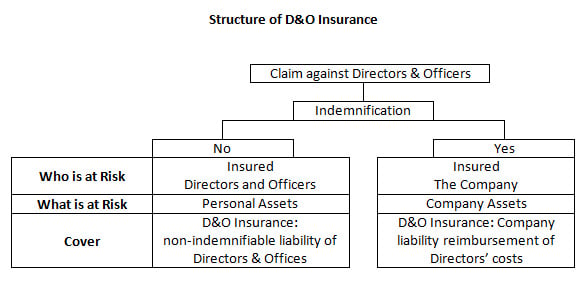Being a Director or Officer of a company can be both challenging and rewarding. This role is enhanced by knowing the organization on whose behalf you are working has invested in the adequate level of Directors & Officers Liability insurance coverage. Directors and Officers can then deliver corporate governance with confidence and a reduced fear of reprisal. Coverage provided by a D&O policy is intended as support or back up, in the event the indemnification Directors and Officers receive from the corporation is not available or is inadequate.
Protecting corporate decisions via Directors and Officers Liability Insurance. Covers the legal liability of Directors and Officers arising out of their fiduciary responsibility to exercise due care in managing corporate affairs. Should their negligence result in a loss to the Corporation, its shareholders, or others, they can be held personally liable. For many actions, the Corporation through its by-laws can indemnify Directors and Officers and this corporate reimbursement is also covered under D & O liability policies.
The intent of D&O Coverage is to provide protection for the wrongful acts of Directors and Officers when they are carrying out their duties and responsibilities for the LDC. Learn more about MEARIE's Enhanced Directors and Officers Endorsement.
Before Insurance, The Best Practices are Diligence, Loyalty & Obedience
The Directors and Officers have a duty to exercise due diligence in overseeing the activities of company they serve. Directors and Officers are required to act in good faith and the best interest of the company. They have three basic duties in performing their responsibilities:
- Duty of Diligence: Directors and Officers must act with care that a reasonably prudent person in a similar position would use under similar circumstances. Act reasonably, in good faith, in the company’s best interest.
- Duty of Loyalty: Directors and Officers are required to refrain from engaging in personal activities that would injure or take advantage of the corporation. They should avoid even the appearance of a conflict. Place the interest of the company before their own.
- Duty of Obedience: Directors and Officers are required to perform their duties in accordance with applicable statues and terms of the Corporation’s Charter. Act within the scope of the company, with in applicable rules and laws.
When Directors and Officers are in breach of these duties and/or fail to carry out the legal duties for the company, an actual or alleged wrongful act occurs.
This duty may also apply to the public at large, and other stakeholders such as the organization’s employees, creditors and customers. In Canada, corporate statutes state Directors and Officers have a fiduciary duty to act honestly, in good faith and in the best interests of the organization – underpinned by Bill 198 which was introduced to protect investors from misleading, insufficient or late corporate disclosures. Failing to meet these standards can give rise to personal liability and, by accepting a position within the corporation, Directors and Officers are putting their personal assets at risk for the benefit of shareholders. Aside from any court-related settlements, fines or damages, the legal costs for any lawsuit against Directors and Officers can be enormous.
MEARIE offers coverage that protects both the Directors and Officers personally, and the company itself. The Directors & Officers are protected financially in the event they are sued and found responsible for certain actions (or inaction) of the company. The company is protected in the event that it is ordered to indemnify its Directors or Officers.

There are a number of areas that may lead to litigation and the potential to result in Directors and Officers liability.
Employment Practices
In Canada the largest number of D&O claims are Employment Practices claims.1
Claims related to Employment Practices could be a claim made against an insured relating to a past, present or prospective employee of the company arising out of:
- Any wrongful dismissal, discharge, or termination (either actual or constructive) of employment
- Employment related misrepresentation
- Wrongful failure to employ or promote, deprivation of career opportunity or wrongful discipline
- Failure to grant tenure or negligent employee evaluation
- Failure to provide adequate employee policies and procedures
- Sexual or workplace harassment of any kind (including the alleged creation of a harassing workplace environment)
- Discrimination, including sexual or workplace harassment or creation of a harassing workplace environment whether direct, indirect, intentional or unintentional.
Statutory Liability Exposures
Potentially, Statutory Liability provides the next greatest exposure in the LDC Sector. Claims related to Statutory Liability originate from over 200 federal and provincial statutes across Canada.2 Some of the most common potential exposures arise from taxes, wages and salaries, and environmental liability. For example:
Taxes – A Director may be held personally liable for a company’s failure to withhold/ deduct taxes as may be required under the Income Tax Act.
Employment Insurance & CPP – Personal liability of the Director may result from the company’s failure to deduct or remit
premiums under the Employment Insurance Act or under the Canada Pension Plan.
Wages/Salaries – The Canadian Business Corporation Act provides that individual Directors of federally incorporated companies are jointly and severally liable to employees for outstanding wages (capped at a six month limitation) earned during their Directorship.
OHSA3 – Every Officer and Director of a corporation must take all reasonable care to ensure the corporation complies with the Occupational Health & Safety Act4 as well as
with any orders and requirements of Ministry of Labour.
Environmental Liability – In Ontario under the Environmental Protection Act,5 an individual Director or Officer has the positive duty to take all reasonable care to prevent the company from causing or permitting an unlawful discharge, failing to notify the regulator (MOE) of a discharge, or committing other specified offences; and is guilty of an offence where the Director fails to carry out that duty.
